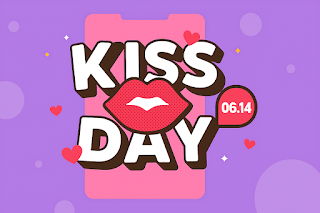Why Do Koreans Celebrate ‘Kiss Day’? – Inside Korea’s Emotional Calendar Culture
Korea celebrates a unique holiday on June 14—Kiss Day. Learn how this romantic ritual fits into Korea’s emotional calendar culture and why it’s more than just a kiss.
What Is Kiss Day?
Every year on June 14, couples in Korea celebrate something called “Kiss Day.” It’s not a public holiday, but it’s widely recognized, especially among the younger generation. On this day, couples are encouraged to share a kiss, buy gifts, post sweet selfies, and show affection both online and offline.
But why? Where did this day come from?
The “14th Day” Phenomenon in Korea
To understand Kiss Day, we need to understand Korea’s unique tradition of “Day Marketing” built around the 14th of every month:
| Month | “14th Day” Name | Description |
|---|---|---|
| February | Valentine's Day | Women give chocolates to men. |
| March | White Day | Men return gifts to women. |
| May | Rose Day | Couples exchange roses. |
| June | Kiss Day | Self-explanatory. |
| December | Hug Day | A warm closure to the year. |
And the list goes on. Some months even include quirky unofficial themes like Black Day (April) for singles who didn’t get any love. These days were never declared by the government. They emerged from a mix of marketing, media, and social culture, and evolved into a kind of unofficial romantic calendar.
Love Meets Marketing
Kiss Day is a golden opportunity for brands—especially in the beauty, fragrance, and lifestyle sectors.
- Lipstick sales spike during early June, with many brands releasing limited “Kiss Day” editions.
- Perfume brands run campaigns with romantic taglines like “One Kiss, One Memory.”
- Restaurants or cafés offer couple discounts or themed desserts.
- On social media, couples post photos tagged #KissDay, boosting visibility and trendiness.
Much like Valentine’s Day in the West, Kiss Day in Korea is a fusion of feeling and commerce, where romantic gestures are also consumer actions.
Global Comparison
Other countries focus mostly on Valentine’s Day or perhaps White Day (in Japan). Korea stands out by having a love-related day every month, which reflects not just romantic energy, but also a unique culture of emotional expression.
In the West, love is celebrated with spontaneity. In Korea, it often gets ritualized—scheduled into specific dates that people look forward to, even if ironically.
This culture allows people—especially young adults—to feel that expressing love isn’t awkward or forced. It’s part of the shared rhythm of life.
Why It Matters: Culture Beyond the Calendar
Kiss Day may sound superficial at first. But when we look deeper, it reveals something more profound:
- The need to express love in a society where work and study dominate daily life.
- A way to reclaim intimacy in a fast-moving, tech-driven culture.
- A mirror of how emotions and branding increasingly overlap in modern societies.
Conclusion: Not Just Kisses—But Connection
So yes, Kiss Day might seem like another excuse to sell roses and lipstick. But it also reveals how deeply Korean society has integrated emotion, identity, and commerce into small daily rituals. These unofficial “14th days” are less about obligation and more about cultivating intentional connection in an increasingly digital world.
Perhaps that’s why even those who don’t celebrate often smile at the idea. A kiss, after all, is still one of the most human ways to say, “I’m here with you.”





Comments
Post a Comment